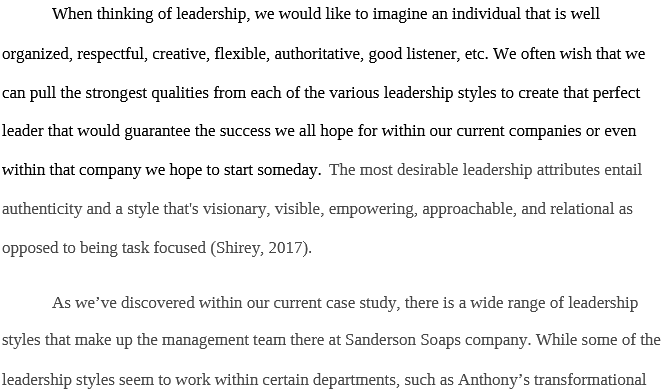PSY 108 2-3 MILESTONE TWO CREDIBLE EVIDENCE EVALUATION.docx -SNHU
$4.99$16.99
PSY 108 2-3 MILESTONE TWO CREDIBLE EVIDENCE EVALUATION.docx -SNHU
The source, “Parents’ Assessment of Parent-child Interaction Interventions,” analyzes different studies amongst families with small children including parents’ behavioral patterns such as stress, attachment, mental health, and social support. The purpose of this research was to analyze the families and long-term vs short-term changes after receiving treatment. The researchers were able to determine that mothers may experience more difficulty than fathers, however, it is possible for both mother and father who face parenting problems to show significant progress during the intervention program. (Neander & Engström, 2009) The source, “Parents’ Assessment of Parent-child Interaction Interventions,” indicates that It is possible to engage parents who have trouble interacting with their children in an intervention program to aid aggressive behavior. As a result of this experiment, the researchers uncovered that the interventions actually led to an increase in mental well-being, positive outlook, less stress, more social support, and effective ways of interacting with other people and reducing problems in their children’s lives. (Neander & Engström, 2009).
Description
PSY 108 2-3 MILESTONE TWO CREDIBLE EVIDENCE EVALUATION.docx -SNHU
The source, “Parents’ Assessment of Parent-child Interaction Interventions,” analyzes different studies amongst families with small children including parents’ behavioral patterns such as stress, attachment, mental health, and social support. The purpose of this research was to analyze the families and long-term vs short-term changes after receiving treatment. The researchers were able to determine that mothers may experience more difficulty than fathers, however, it is possible for both mother and father who face parenting problems to show significant progress during the intervention program. (Neander & Engström, 2009) The source, “Parents’ Assessment of Parent-child Interaction Interventions,” indicates that It is possible to engage parents who have trouble interacting with their children in an intervention program to aid aggressive behavior. As a result of this experiment, the researchers uncovered that the interventions actually led to an increase in mental well-being, positive outlook, less stress, more social support, and effective ways of interacting with other people and reducing problems in their children’s lives. (Neander & Engström, 2009).
PSY 108 2-3 MILESTONE TWO CREDIBLE EVIDENCE EVALUATION.docx -SNHU
Key TakeawaysAccording to the speaker, how does procrastination work? Urban stated, “I had a hypothesis that the brains of procrastinators were actually different than the brains of other people”. He explains that in the head of a non-procrastinator there is a rational decision-maker and in the head of a procrastinator, there is not only a rational decision-maker but also an instant gratification monkey. He then goes on to say that the rational decision-maker will decide to be productive but the instant gratification monkey does not agree with that plan and decides to “take the wheel” and make us want to engage in non-productive activity. The procrastinator’s instant gratification monkey is living fully in the present and not thinking about the past or future. He only cares about “easy and fun”
PSY 108 2-3 MILESTONE TWO CREDIBLE EVIDENCE EVALUATION.docx -SNHU
- PSY 211 – Lifespan Development (5015 Documents),
- PSY 215 – Abnormal Psychology (4335 Documents),
- PSY 108 – Introduction to Psychology (3759 Documents),
- PSY 223 – Statistics for Psychology Research (2652 Documents),
- PSY 216 – Psychology of Personality (1841 Documents),
- PSY 510 – Research Methods (1748 Documents),
- PSY 520 – Research Methods in Psychology II (1469 Documents),
- PSY 257 – Psychology (1451 Documents),
- PSY 310 – Criminal Psychology (1393 Documents),
- PSY 200 – FOUNDATIONS OF ADDICTIONS (1379 Documents),
Only logged in customers who have purchased this product may leave a review.







Reviews
There are no reviews yet.